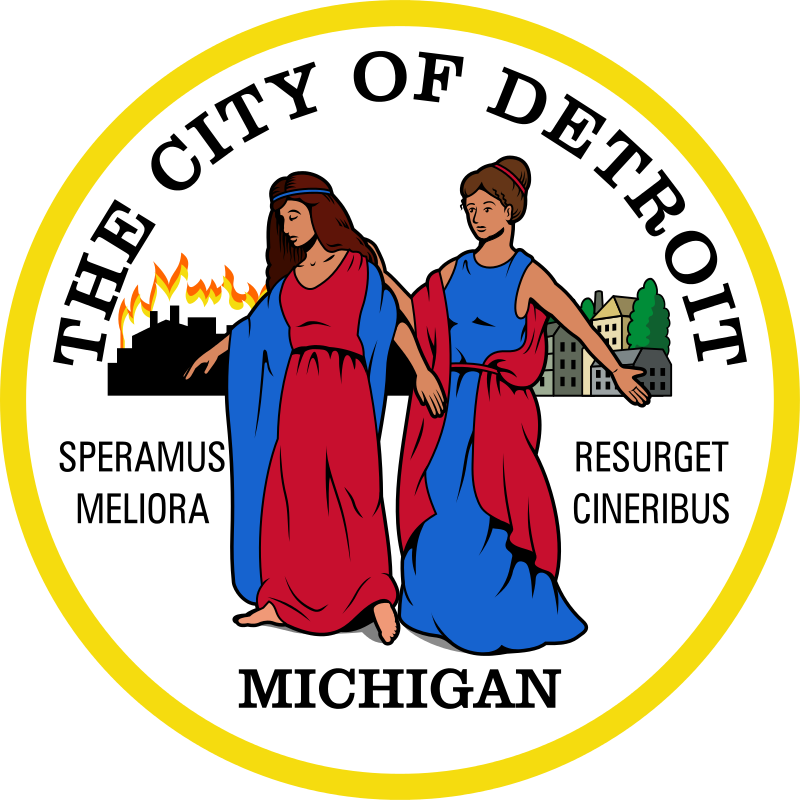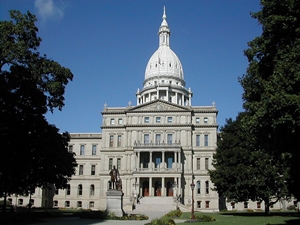October 25, 2016 •
Michigan Legislators Introduce Campaign Finance and Ethics Bills
On October 19, 2016, two bills were introduced to the Michigan Legislature regarding campaign finance and ethics regulation. House Bill 6007 prohibits, for 18 months after leaving office, a former member of the Michigan Legislature from making expenditures or receiving […]
 On October 19, 2016, two bills were introduced to the Michigan Legislature regarding campaign finance and ethics regulation.
On October 19, 2016, two bills were introduced to the Michigan Legislature regarding campaign finance and ethics regulation.
House Bill 6007 prohibits, for 18 months after leaving office, a former member of the Michigan Legislature from making expenditures or receiving compensation or reimbursement for actual expenses for lobbying that equal or exceed the limit established to require registration as a lobbyist agent.
House Bill 5959 prohibits campaign contributions except during a year there is a primary, general, or special election for the office the candidate is seeking to be elected.
The Legislature has 11 scheduled days to approve bills for the 2016 legislative session.
August 2, 2016 •
Michigan to Hold Special Primary Election
Gov. Rick Snyder has called for a special primary election to take place August 30. Candidates will be running to fill the vacancy created after the sudden death of state Rep. Julie Plawecki, who served the 11th House District. The […]
 Gov. Rick Snyder has called for a special primary election to take place August 30.
Gov. Rick Snyder has called for a special primary election to take place August 30.
Candidates will be running to fill the vacancy created after the sudden death of state Rep. Julie Plawecki, who served the 11th House District.
The general election for the completion of Plawecki’s term will be held November 8, with the winner serving through the end of 2016.
July 8, 2016 •
Ann Arbor, MI Voters to Decide on Election Cycle Change
This November, voters will decide whether term limits for the mayor and City Council members should be increased from two to four years. Election cycles would remain staggered, but the proposed amendment to the city charter would eliminate elections in […]
 This November, voters will decide whether term limits for the mayor and City Council members should be increased from two to four years.
This November, voters will decide whether term limits for the mayor and City Council members should be increased from two to four years.
Election cycles would remain staggered, but the proposed amendment to the city charter would eliminate elections in odd years, which have typically had low turnout.
Opponents of the amendment argue longer terms will decease officials’ accountability to voters, while those in favor hope for higher city election participation as a result of the new terms.
Photo of downtown Ann Arbor by Andrew Horne on Wikimedia Commons.
July 5, 2016 •
Court Issues Injunction on Michigan Campaign Finance Law
A U.S District Court has issued a preliminary injunction against provisions of Senate Bill 571, which enable corporations to deduct PAC contributions from employees’ paychecks while prohibiting labor unions from doing the same. The ruling supporting the court’s decision cited […]
 A U.S District Court has issued a preliminary injunction against provisions of Senate Bill 571, which enable corporations to deduct PAC contributions from employees’ paychecks while prohibiting labor unions from doing the same.
A U.S District Court has issued a preliminary injunction against provisions of Senate Bill 571, which enable corporations to deduct PAC contributions from employees’ paychecks while prohibiting labor unions from doing the same.
The ruling supporting the court’s decision cited freedom of political speech and evenhanded application of law as reasons for the injunction.
This is the second provision of the law to be successfully challenged; earlier in the year, a federal judge halted a different portion of the law prohibiting communication with community residents regarding ballot proposals during the 60 days prior to an election.
June 20, 2016 •
Detroit, MI Demolition Contracts Subject to Council Vote
The City Council will begin voting next week on existing city-funded demolition contracts worth over $25,000. Mayor Mike Duggan’s administration discovered the existing contracts have never sought required City Council approval during a review of purchasing ordinances. Going forward, officials […]
 The City Council will begin voting next week on existing city-funded demolition contracts worth over $25,000.
The City Council will begin voting next week on existing city-funded demolition contracts worth over $25,000.
Mayor Mike Duggan’s administration discovered the existing contracts have never sought required City Council approval during a review of purchasing ordinances. Going forward, officials have committed to a council vote on all contracts valued over $25,000, as required by law.
The city is still investigating the number of contracts performed without proper council approval since Duggan revamped the demolition program in 2014.
June 10, 2016 •
Michigan Legislature Adjourns for Summer Break
The Legislature has adjourned until July 13, 2016. Lobbying, ethics, and campaign finance were not matters of primary focus during this session; instead, bills passing the Legislature on its final day in session were focused on improving the state’s horse […]
 The Legislature has adjourned until July 13, 2016.
The Legislature has adjourned until July 13, 2016.
Lobbying, ethics, and campaign finance were not matters of primary focus during this session; instead, bills passing the Legislature on its final day in session were focused on improving the state’s horse racing industry, rights for domestic violence victims, authorizing police to alert cell phone users in areas where there are active shooters, and updating driving under the influence tests to better screen for drug use.
The House and Senate will be back in session for one day each in July and August, but are expected to address primarily housekeeping matters in those sessions.
Photo of the Michigan State Capitol by Brian Charles Watson on Wikimedia Commons.
May 20, 2016 •
Michigan Government Transparency Bills Clear House Committee
A package of government transparency bills making the governor and Legislature subject to Michigan public record laws has reported out of a House committee in a unanimous vote. The reform package strives to open the majority of the Legislature’s records […]
 A package of government transparency bills making the governor and Legislature subject to Michigan public record laws has reported out of a House committee in a unanimous vote.
A package of government transparency bills making the governor and Legislature subject to Michigan public record laws has reported out of a House committee in a unanimous vote.
The reform package strives to open the majority of the Legislature’s records to public inspection and would eliminate many existing public records exemptions for the governor and lieutenant governor by including these records under the umbrella of the Freedom of Information Act.
Lawmakers are hopeful the bills will pass the Legislature prior to adjournment for the summer. If passed, the reform measures would apply only to records created after January 1, 2017.
April 25, 2016 •
Michigan Election Law Faces Another Legal Challenge
The Michigan election law enacted by last session’s Senate Bill 571 is facing yet another legal challenge. A group of labor unions filed suit against the State of Michigan claiming that the law is unconstitutional. The contested provision of the […]
 The Michigan election law enacted by last session’s Senate Bill 571 is facing yet another legal challenge. A group of labor unions filed suit against the State of Michigan claiming that the law is unconstitutional.
The Michigan election law enacted by last session’s Senate Bill 571 is facing yet another legal challenge. A group of labor unions filed suit against the State of Michigan claiming that the law is unconstitutional.
The contested provision of the law allows corporations to use payroll deductions for employees to make contributions to the business’ political action committee (PAC). The unions claim this is unfair because they are prohibited from using payroll deductions for members to make contributions to union PACs.
The lawsuit comes just weeks after a federal judge in a separate matter found other provisions of this law unconstitutionally vague.
April 20, 2016 •
Michigan Bill Introduced to Increase Lobbyist Reporting Requirements
Michigan State Rep. Gary Glenn recently introduced legislation to increase lobbyist reporting requirements. House Bill 5535 would require lobbyists and lobbyist agents to file reports on a quarterly basis. Currently, reports are only required to be filed on a semi-annual […]
 Michigan State Rep. Gary Glenn recently introduced legislation to increase lobbyist reporting requirements.
Michigan State Rep. Gary Glenn recently introduced legislation to increase lobbyist reporting requirements.
House Bill 5535 would require lobbyists and lobbyist agents to file reports on a quarterly basis. Currently, reports are only required to be filed on a semi-annual basis.
The bill is now in the Committee on Oversight and Ethics and has yet to pass either house.
Photo of the Michigan State Capitol by Brian Charles Watson on Wikimedia Commons.
April 14, 2016 •
Special Election Called in Michigan
Michigan Gov. Rick Snyder has set a date for a special election to fill Virgil Smith’s former state senate seat. Smith’s resignation became effective after beginning a 10-month jail sentence related to a shooting incident involving his ex-wife. A primary […]
 Michigan Gov. Rick Snyder has set a date for a special election to fill Virgil Smith’s former state senate seat. Smith’s resignation became effective after beginning a 10-month jail sentence related to a shooting incident involving his ex-wife.
Michigan Gov. Rick Snyder has set a date for a special election to fill Virgil Smith’s former state senate seat. Smith’s resignation became effective after beginning a 10-month jail sentence related to a shooting incident involving his ex-wife.
A primary election for the vacant 4th district seat will be held August 2, 2016. The general election is scheduled for November 8, 2016.
February 22, 2016 •
Special Election Called in Michigan
Gov. Snyder has called a special election to fill the vacancy in House District 28 following the appointment of State Rep. Derek Miller as the Macomb County Treasurer. The special primary election will be held on August 2, with the […]
 Gov. Snyder has called a special election to fill the vacancy in House District 28 following the appointment of State Rep. Derek Miller as the Macomb County Treasurer. The special primary election will be held on August 2, with the special general election slated for November 8. Both special elections align with the primary and general election dates for the current election cycle.
Gov. Snyder has called a special election to fill the vacancy in House District 28 following the appointment of State Rep. Derek Miller as the Macomb County Treasurer. The special primary election will be held on August 2, with the special general election slated for November 8. Both special elections align with the primary and general election dates for the current election cycle.
The special election is for a term running through January 1, 2017. Candidates are able to run for the term expiring on January 1, 2017 as well as the full term after.
February 8, 2016 •
Judge Temporarily Halts a Provision in Michigan Election Law Bill
A federal judge has put a temporary stop on a controversial part of a recently passed campaign finance bill. Senate Bill 571, which included significant changes in the state’s election law, contained a provision prohibiting the use of public resources […]
 A federal judge has put a temporary stop on a controversial part of a recently passed campaign finance bill. Senate Bill 571, which included significant changes in the state’s election law, contained a provision prohibiting the use of public resources by public entities such as schools and libraries in the 60 days before an election.
A federal judge has put a temporary stop on a controversial part of a recently passed campaign finance bill. Senate Bill 571, which included significant changes in the state’s election law, contained a provision prohibiting the use of public resources by public entities such as schools and libraries in the 60 days before an election.
The provision was found to be unconstitutionally vague, as it did not clarify what was permissible. While several bills to fix the provision have subsequently been introduced, it is likely none of them will be passed by the upcoming March 8 election.
January 8, 2016 •
Michigan Governor Signs Senate Bill 571
This week, Governor Snyder signed Senate Bill 571, a bill that affects what public officials and organizations can and cannot do within 60 days of an election. The bill prohibits local officials from publicly discussing ballot proposals or millage issues […]
 This week, Governor Snyder signed Senate Bill 571, a bill that affects what public officials and organizations can and cannot do within 60 days of an election. The bill prohibits local officials from publicly discussing ballot proposals or millage issues in the 60 days leading up to an election.
This week, Governor Snyder signed Senate Bill 571, a bill that affects what public officials and organizations can and cannot do within 60 days of an election. The bill prohibits local officials from publicly discussing ballot proposals or millage issues in the 60 days leading up to an election.
Despite approving the bill, Snyder urged the Legislature to pass further legislation clarifying some key provisions of the bill that some say infringe on protected free political speech. The 53 page bill was originally much shorter until last minute amendments were passed with no public hearings. Senate Bill 571 also eliminates the need for February quarterly reports for political action committees.
September 25, 2015 •
Unlikely Candidates Running in Michigan Special Election
A special primary election has been scheduled for November 3, 2015, to fill the seats in state House Districts 80 and 82. These seats were previously held by Rep. Cindy Gamrat and Rep. Todd Courser, respectively. Gamrat was expelled by […]
 A special primary election has been scheduled for November 3, 2015, to fill the seats in state House Districts 80 and 82.
A special primary election has been scheduled for November 3, 2015, to fill the seats in state House Districts 80 and 82.
These seats were previously held by Rep. Cindy Gamrat and Rep. Todd Courser, respectively. Gamrat was expelled by the House on September 11, 2015, and Courser resigned the same day following allegations of misconduct and misuse of taxpayer resources in an attempt to hide their extramarital affair.
Now, despite opposition from the House, both are running in the special election to fill these seats. If either or both of them win, there is speculation the House could refuse to seat them; however, most representatives seem reluctant to commit to such action at this point.
The special general election will be held on March 8, 2016.
State and Federal Communications, Inc. provides research and consulting services for government relations professionals on lobbying laws, procurement lobbying laws, political contribution laws in the United States and Canada. Learn more by visiting stateandfed.com.


